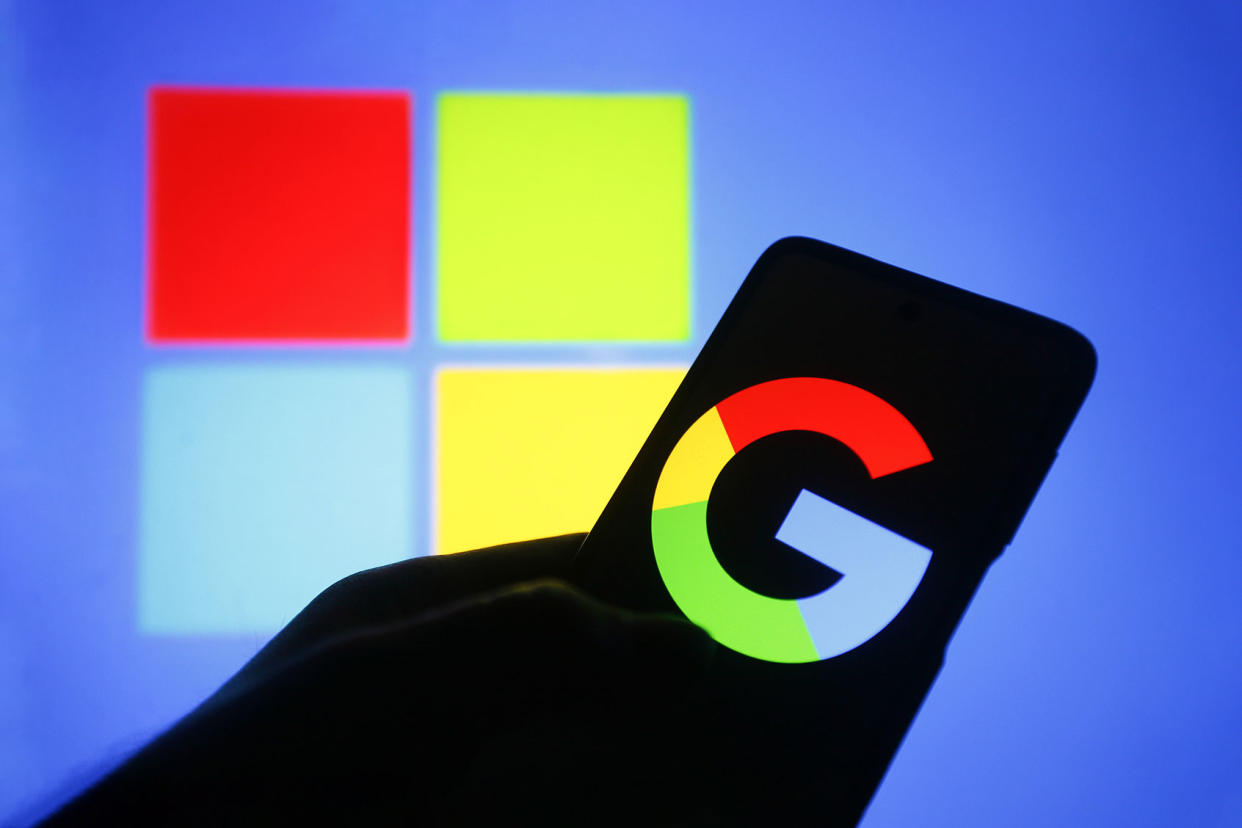Won’t someone think of the Bing!? Microsoft laughably accuses Google of monopoly

If you were going to give The Three Stooges a modern-day Silicon Valley treatment, you couldn’t write a better opening scene than the one that played out last Monday in Washington D.C., when Microsoft CEO Satya Nadella took the stand in the most significant tech-antitrust trial in 15 years, and accused Alphabet’s Google of having a monopoly on search-engine traffic. We’re talking classic comedy here, people — Laurel and Hardy antitrust antics, Lucy and Ethel fighting in a data-stomping vat, a Benny Hill Goes to Washington episode lacking only the “Yackety Sax” soundtrack.
Are we in a seemingly inescapable government-surveillance dystopia, eagerly enabled by the unchecked data-mining and Congressional lobbying dollars of corporate jötunn like Microsoft, Google, Apple, Amazon, Facebook and OpenAI? Sure. Is it likely that Google will appeal any pro-regulatory outcome of the antitrust case, while both it and Microsoft continue simping for the Pentagon’s domestic spying operations? Very. But will that stop us from laughing like hyenas at our tech-emperors’ new clothes whenever we see their bare bottoms jiggling through the halls of justice, just begging for a slap? Not on my watch.
The Justice Department and 38 US state attorneys general have accused Google of using monopolistic business practices to corner the search-engine market by illegally paying Apple billions of dollars to make Google the default search engine of Apple’s Safari browser. Regardless of outcome, the suit may already be too little, too late to truly end Google’s reign. But it’s nonetheless worth pursuing in the public interest.
Nadella’s appearance before Judge Amit Mehta in the US District Court for the District of Columbia comes just two weeks into the trial, and he’s the most prominent tech titan to testify in the case so far.
“You get up in the morning, you brush your teeth, you search on Google,” Nadella lamented before the court, as though the phone alarm that wakes you and the device you use search with couldn’t possibly be Microsoft products.
Nadella, the top dog at a $2.4 trillion company (the second-most valuable in the world), described a “nightmare” future where websites would only sell your browsing data to Google, giving it an exclusive advantage in the AI training-data arms race. Nadella described a hellscape where poor Microsoft can’t train its own AI and Bing search algorithms unless it pays websites more than Google for the data it now gets mostly for free.
“What is publicly available today, will it be publicly available tomorrow?” he asked, adding that it would only further entrench Google’s search dominance. “I worry a lot that, in fact, this vicious cycle that I’m trapped in can become even more vicious.”
Alas. Won’t someone think of the Bing?
Nadella’s main argument, though, hinged on his complaint that Google is still the default search engine used in Apple products. Despite the fact that the whole trial centers on a possible illegal pay-for-play deal between Google and Apple, Nadella openly told the court that Microsoft too was also ready to throw down $15 billion a year if Apple would just choose Bing for its products’ default search engine instead of Google.
“Defaults are the only thing that matters,” he said. “It would be a game-changer.”
The withering pleas of Nadella have fallen on deaf ears among those who watched Microsoft gather into a literal monopoly through the early '90s, then fight its way through a losing battle in 1998 as the feds sued it for using a 70% market share to further entrench itself with anti-competitive behavior. The Google antitrust case is the biggest since then.
Want more health and science stories in your inbox? Subscribe to Salon's weekly newsletter Lab Notes.
Back then CEO Bill Gates was arguing to the Federal Trade Commission and the Justice Department about why shoving its Internet Explorer browser down everyone’s throats was the definition of innovation in tech. Of course, that was well after Gates shamelessly ripped of Steve Jobs in the '80s by stealing the MacOS design and turning it into the Great Value brand of operating systems known as Windows 1.0 and 2.0 — resulting in a famous 1988 lawsuit.
“Everybody talks about the open web, but there is really the Google web,” Nadella said at the trial.
It’s difficult to imagine a more delicious scene than that of Microsoft, decades after its backstabbing of Apple, falling to its knees begging for Apple’s help as Google threatens to crush the once-ruler of the desktop world. Difficult, yes — but not impossible. Just ask any devoted Linux user.

